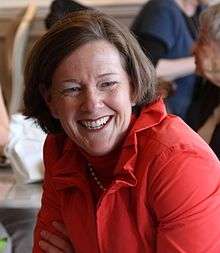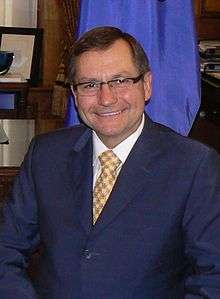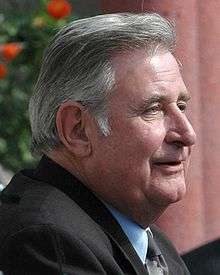Dave Hancock
| Dave Hancock QC | |
|---|---|
 Dave Hancock in 2011 | |
| 15th Premier of Alberta | |
|
In office March 23, 2014 – September 15, 2014 | |
| Monarch | Elizabeth II |
| Lieutenant Governor | Donald Ethell |
| Preceded by | Alison Redford |
| Succeeded by | Jim Prentice |
| MLA for Edmonton-Whitemud | |
|
In office March 11, 1997 – September 15, 2014 | |
| Preceded by | Mike Percy |
| Succeeded by | Stephen Mandel |
| Personal details | |
| Born |
David Graeme Hancock[1] August 10, 1955 Fort Resolution, Northwest Territories |
| Political party | Progressive Conservative |
| Spouse(s) | Janet |
| Children | three |
| Residence | Edmonton, Alberta |
| Alma mater | University of Alberta |
| Occupation | lawyer |
David Graeme "Dave" Hancock, QC (born August 10, 1955) is a Canadian lawyer and was the 15th Premier of Alberta in 2014. From 1997 to 2014 he was a Member of the Legislative Assembly of Alberta representing the constituency of Edmonton-Whitemud as a Progressive Conservative.[2] Hancock announced his resignation from the legislature on September 12, 2014.[3]
Early life
Hancock was born August 10, 1955 in Fort Resolution, Northwest Territories and grew up in Hazelton, British Columbia. He went to high school in Fort Vermilion, Alberta before moving to Edmonton in 1972.
Hancock was politically involved from a young age, serving as the president of the Progressive Conservative Association of Alberta's youth wing from 1974–1976. He later served as party president from 1990–1992. Under his leadership, the Progressive Conservative Party instituted a one-member-one-vote system for leadership conventions and introduced a Statement of Principles and a grassroots policy development process.
Before being elected, Hancock was a partner with Matheson and Company, Barristers and Solicitors, having received his law degree from the University of Alberta.
Political career
Electoral record
Mike Percy's retirement after serving one term in the Legislature for the Alberta Liberal Party left open the constituency of Edmonton-Whitemud, the riding once held by former Premier Don Getty. Hancock secured the PC nomination and squared off against Corky Meyer of the Liberals and Charan Khehra of the Alberta New Democratic Party in the 1997 provincial election. Hancock won the constituency with 51 per cent of the vote, beating runner-up Meyer by 2,020 votes. He was one of only two Progressive Conservatives elected in Edmonton's 19 constituencies (Julius Yankowsky, Edmonton-Beverly-Clareview, was the other.)
Hancock was returned to the Legislature in the 2001 provincial election, increasing his share of the popular vote to 59 per cent. He defeated Liberal candidate Bruce King, the runner-up, by 4,381 votes. In the 2004 provincial election, Hancock was one of only three out of 10 incumbent PC MLAs in Edmonton to retain their seat. He survived Liberal Donna Smith's bid for the seat, defeating her by 929 votes while winning 46 per cent of the vote. Hancock was elected to his fourth term in the 2008 provincial election, winning 58 per cent of the vote in beating Liberal Nancy Cavanaugh by 5,049 votes.
In Cabinet
Hancock has spent his entire provincial political career in cabinet. As a rookie MLA in the 24th Alberta Legislature, Premier Ralph Klein named him Minister of Intergovernmental and Aboriginal Affairs. In that capacity, he spearheaded the creation of the Aboriginal Policy Framework, which set out the basic structure for existing and new governmental policies regarding aboriginal affairs.
Two years into his first term, Hancock was promoted to Minister of Justice and Solicitor General and Government House Leader. During his five years as Justice Minister, he worked to limit conditional sentencing for violent crime and drunk driving offenders. He also developed a flagging system to identify Alberta's chronic drunk drivers and introduced specialized domestic violence courts.
Hancock remained Justice and Solicitor General Minister and House Leader after his re-election in 2001, but was also given the job of Attorney General. He served in those roles until after the 2004 election, when Klein appointed him Minister of Advanced Education. During his time in that job, Hancock was most noted for passing the Access to the Future Act, which created a $1 billion endowment fund for post-secondary education. The fund is now valued at $3 billion. He also approved degree-granting status for several small colleges in the province. He resigned that post in April 2006 to seek the leadership of the Progressive Conservative Party.
When Ed Stelmach won the leadership and subsequently became Premier in December 2006, he promoted Hancock to the high-profile health portfolio. As Minister of Health and Wellness, he presided over funding increases for the Alberta Bone and Joint Health Institute, enhanced access to cardiac and cancer care through process improvements, and an increase of primary care networks to 8 across the province. Hancock also initiated several health prevention measures, including a wellness fund for healthy communities, expansion of metabolic screening, and a new colorectal cancer screening program.
Stelmach appointed Hancock Minister of Education following the provincial election in March 2008. Since then, Hancock has approved funding increases to accredited private schools, and announced plans to build 18 new schools in Edmonton and Calgary.
On December 6, 2013, Hancock was appointed as Deputy Premier and Minister of Innovation and Advanced Education. Prior to that, Hancock served as Minister of Human Services and Government House Leader under the Redford government.
2006 Leadership bid
In April 2006, Hancock resigned his post as Minister of Advanced Education and announced his intentions to replace Klein as the leader of the Progressive Conservative Party. He was considered a long shot against favourites like former provincial treasurer Jim Dinning and Ted Morton. His leadership campaign was managed by Brian Mulawka and was headquartered in Edmonton where he had been an MLA and where most of his support was. Hancock was unable to secure any endorsements from PC caucus members, but was endorsed by Edmonton-Centre Conservative MP Laurie Hawn. He placed fifth out of eight candidates on the first ballot, garnering 7,595 votes, more than 20,000 votes behind the first place Dinning. Hancock, along with five others, were dropped from the second ballot. Along with fellow leadership candidates Mark Norris and Lyle Oberg, Hancock supported Stelmach on the final ballot.
Premiership
Following the announcement of Alison Redford's resignation as both leader of the Progressive Conservative Party and premier, Hancock was named interim party leader by the Progressive Conservative caucus on March 20, 2014, and, with such confidence from the majority of the legislature, was appointed as Premier of Alberta.[4] Hancock was sworn in at Government House on March 23, 2014. He was succeeded as Premier by Jim Prentice on September 15, 2014 and retired from the legislature on the same day. He is the shortest serving premier in the province's history.
Personal life
Hancock lives in Edmonton with his wife Janet, who is a principal at Lillian Osborne High School in Edmonton.[5][6] He has three children.[2]
References
- ↑
- 1 2 Legislative Assembly of Alberta, Biography for Honourable Dave Hancock, QC: https://www.assembly.ab.ca/net/index.aspx?p=mla_bio&rnumber=42
- ↑ "Outgoing Alberta premier Dave Hancock resigns MLA seat". September 12, 2014. Retrieved September 12, 2014.
- ↑ Janus, Andrea (March 20, 2014). "Redford's replacement Dave Hancock promises 'government Albertans want'". CTV News. Retrieved March 23, 2014.
- ↑ http://www.edmontonjournal.com/Three+schools+slated+flung+Edmonton+suburbs+existing+school+being+expanded+with/9490079/story.html
- ↑ http://blogs.calgaryherald.com/2014/03/23/premier-dave-hancock-10-things-to-know-about-our-new-premier/
External links
| |||||||||||||
| ||||||||||
| ||||||||
| ||||||||
| ||||||||


